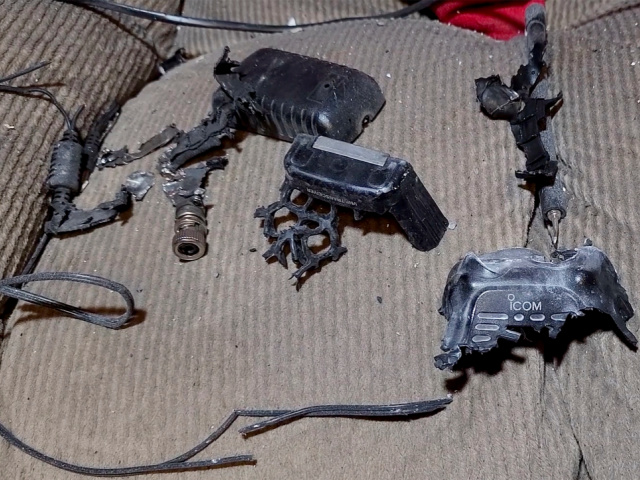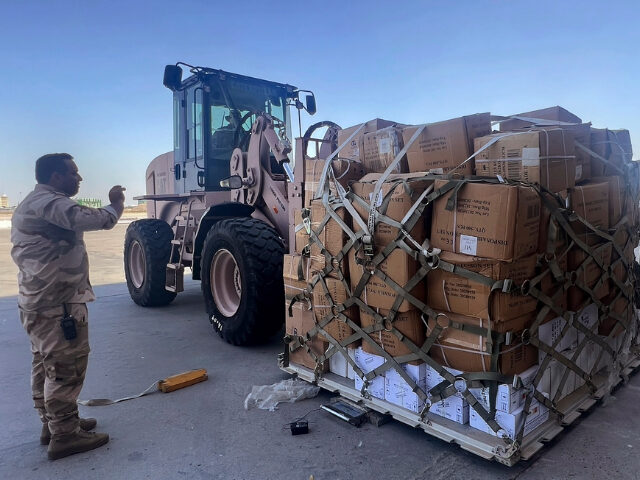The explosions of pagers and walkie-talkies that Lebanon’s Hezbollah terrorists obtained from foreign suppliers are prompting a good deal of worldwide anxiety about complex technology supply chains, many of which run through China, an authoritarian communist country with a proven track record of weaponizing both technology and international trade.
Hezbollah’s pagers were purchased under the label of a Taiwanese company, which, in turn, said the actual units that exploded in the hands and pockets of the terrorists were made by a shadowy Hungarian firm under a paid licensing agreement. The handheld radios that blew up the next day were discontinued models designed by a Japanese firm that believes the sabotaged units were unauthorized knockoffs.
In both cases, murky supply chains left Hezbollah with technology that did not come from the companies it believed were supplying it. The exact provenance of the nominally Japanese walkie-talkies remained uncertain as of Friday.
Reuters noted on Friday that there is a thriving market for older technology from Asia, where customers are happy to buy still-useful equipment from the early 2010s at discount prices — and those markets are rife with “counterfeiting, surplus inventories and complex contract manufacturing deals” that can make it nearly impossible to track the true source of an item.
Analysts said that slipping some sort of undetectable explosive into Hezbollah’s pagers was an impressive feat, but compromising its supply chains was a relatively simple matter. This is especially true with smaller companies since they lack the resources to police supply chains or comb discount retail websites in search of fake products.

This video grab shows a walkie-talkie that exploded inside a house in Baalbek, East Lebanon, on September 18, 2024. (AP Photo)
China has dozens of online shops selling walkie-talkies branded by Hezbollah’s chosen brand of Icom, for example, and most of them sell the very same 2014-era discontinued models that literally blew up in Hezbollah’s faces on Wednesday. Icom insists it has not produced that model in years, but Chinese warehouses are full of them and only reluctantly will the dealers admit some of the units are “Chinese-made imitations.”
The Washington Examiner, on Thursday, took Hezbollah’s pagers of doom as a sign that Americans “should be wary of continuing to rely on Chinese supply chains for critical goods in our economy.”
The situation with many popular consumer electronics items in the U.S. is not all that much different from Hezbollah discovering that its “Taiwanese pagers” were actually made by a fishy outfit in Budapest:
Take the ubiquitous iPhone. Despite Apple being an American company, key components of almost every iPhone, including the battery, processor, and camera, are made in China. While China does not have access to Apple’s source code, or at least so it is believed, the Chinese Communist Party’s dominance over the country’s private sector affords it great latitude of action.
Secretly sabotaging tens of millions of iPhone batteries so they overheat on command may seem far-fetched, but it is doable. The risk of malevolent Chinese action with these devices or other technical goods must be considered a real possibility.
China is also a major supplier of broadcasting equipment, computers, and office machine parts. All these products are sabotage threats. Huawei offers an instructive example. Riven with technical “backdoors” that allow vast espionage and sabotage activities, Huawei’s telecommunications network has fortunately been restricted from access to the U.S. market. But the same cannot be said of U.S. allies, such as Hungary.
Center for Strategic and International Studies (CSIS) analyst and former Commerce Department official Bill Reinsch told Politico that the Hezbollah blasts would “create some degree of panic in the private sector” over supply chain vulnerabilities.
Warehouses around the world are filled with products whose components would be difficult to trace even in carefully regulated shipping chains, let alone the discount knockoff pipeline. Paranoid terrorists are probably pickier about their equipment purchases than most consumers, but Hezbollah wound up with bombs in its radios, and no one is quite certain where those radios were sitting on their long supply chain when the explosives were introduced.
Conversely, some electronics consultants are worried about damage to the industry as customers grow nervous about their gear. Pagers and walkie-talkies are certainly less popular in Lebanon than they were at the beginning of September. Onshoring advocates have another arrow in their quivers as they argue for more secure domestic production instead of relying on complicated global supply chains.
“It’s truly amazing how little the technology buyers know about what exists either from a software perspective or from a hardware perspective. Are all the little sensors and cameras or processing components what they say they are?” remarked Daniel Bardenstein, co-founder of software supply chain security firm Manifest.
“This exposes the kind of risk that we’ve been running, with hardware and software running in countries of concern,” former Senate Armed Services Committee policy director Mark Montgomery told the Washington Post on Thursday.
The Washington Post recalled that one of former National Security Agency (NSA) contractor Edward Snowden’s leaks in 2014 involved NSA operatives intercepting a shipment of electronics from U.S. networking giant Cisco Systems and planting electronic surveillance devices in them without notifying the company. The altered Cisco hardware was then shipped to foreign customers.
The Chinese Communist government rarely lets a cybersecurity controversy pass without quoting from Snowden’s leaks to buttress its argument that America, not China, is the great security threat of the 21st Century.
The South China Morning Post (SCMP) reported on Wednesday that the Hezbollah blasts have caused some anxiety in China, especially concerning electronics imported from Taiwan.
“There could be hawkish elements in China who assume that Taiwan, as a close ally of the U.S., who, in turn, is a close ally of Israel, is somehow complicit in this cloak and dagger operation. China might cast an even more wary eye on other Taiwanese industries,” said research fellow Muhammad Faizal Abdul Rahman of the S Rajaratnam School of International Studies in Singapore.
“At the strategic level, it suggests that military and intelligence agencies of major powers and their powerful allies could exploit or weaponise global supply chains to pre-position tools of asymmetric warfare that would be activated during times of conflict or when the objectives of war changes,” Rahman said.

COMMENTS
Please let us know if you're having issues with commenting.